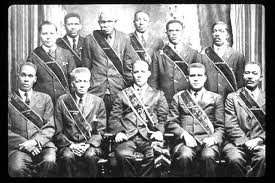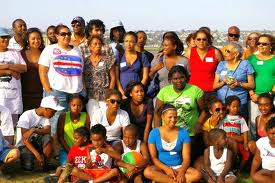The Cape Verdean diaspora
There are many Cape Verdean communities in the world. Because Cape Verde was a colony of Portugal, the largest community is of course based in Portugal.

But there are also communities in France, the UK and in The Netherlands. And not only in Europe, also in the US and South America. (Photo Suzanna Lubrano in Ebony)
In a story on the blog 'The Great Cape Verde Adventure' the blogger writes about this Cape Verdean diaspora.
"How many Cape Verdeans actually live outside of Cape Verde? These individuals comprise the Cape Verdean diaspora.
The popular thinking is that more Cape Verdeans live outside Cape Verde than live within it. The poplation of Cape Verde is just over half-million residents in 2011 (based on the most recent census). I've heard estimates for the population of the diaspora that range from half-million to one million.
And it's a very interesting question to ask for several reasons.First, it has significant implications for the country's economy because almost 10% of the GDP comes from remittances sent to Cape Verdean families from members who live in other lands, and provides support to families for the basics of living as well as to start small businesses. Remittances were actually an even higher percentage of the total economic output but have been surpassed by tourism and foreign direct investments."
Read the full story at http://greatcvadventure.blogspot.com
Cape Verde for absolute beginners
The Republic of Cape Verde is an island country, spanning an archipelago of 10 islands located in the central Atlantic Ocean, 570 kilometres off the coast of Western Africa.
The previously uninhabited islands were discovered and colonized by the Portuguese in the 15th Century, and became an important location in the Atlantic slave trade due to their geographically advantageous position.
Most of the population is of creole ethnicity, mixed from black African and European descent. The European men who colonized Cape Verde did not usually bring wives or families with them. As female African slaves were brought to the islands inter-marriages occurred (source wiki).
__________________________
The Cape Verdean diaspora
A treasure trove of info about vacationing, living or retiring in Cape Verde. |
| Horace Silver, jazz pianist |
 |
| Cape Verde Festival, RI, USA |
 |
| Associacão Beneficiente Caboverdiana |
 |
| Cape Verdeans, Southern California, USA |
 |
| New Bedford, Cabo Verde Expo |
What defines the diaspora? Is it only those who were born in Cape Verde and have emigrated? Or would the number include second, third or even fourth generations who were born in foreign lands of Cape Verdean parents? What about Cape Verdeans who emigrated and married non-Cape Verdeans? Are their kids, like famous Jazz pianist Horace Silver, part of the diaspora?
For an interesting scoop on the making of a new documentary by Claire Andrade, about the history of one on the oldest Cape Verdean communities in the USA, see the video below: And what about all those foreigners who have no Cape Verdean ancestry but want to come live in Cape Verde? LOL. Maybe this is the clue to the answer. The number of people outside Cape Verde who consider themselves connected to it for one reason or another may far exceed its current population. Perhaps that includes you! If not, before you visit Cape Verde, get to know someone from there who lives in your community.>via: http://greatcvadventure.blogspot.com/2011/06/cape-verdean-diaspora.html
